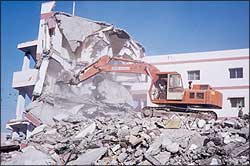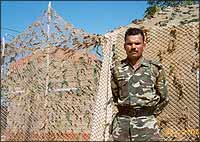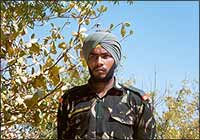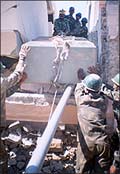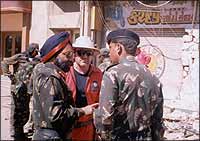| March 2, 2001 |

|
HOME | NEWS | SPECIALS | |||||||||||
|

|
The Rediff Special/Archana Masih Warriors For Peace
Part I: The Courage of Bhuj
It was a battle for saving lives and Lance Naik Digvijay Singh's weapons were a hammer and chisel. The airmen's quarters had collapsed in the January 26 earthquake, and his party of three men were trying to cut through the concrete. They cut through a wall to find a woman -- she was alive. Then another man -- alive. "We had to cut the wall of the third wall and drill in a lying position -- the debris was almost six metres thick. It took me over two-and-a-half- hours," says the 27-year-old soldier from Ballia, Uttar Pradesh. In the adjacent building, he made a small opening to pull out a five-year-old girl. She had survived, while her parents lay dead beside her. "I carried her in my arms and she told me that her parents were sleeping. What could I say? I just nodded and handed her to an air force doctor." By the end of day three, he had saved three lives and pulled out many corpses at the risk of endangering his life.
Several state-of-the-art rescue teams have come and gone, but it is the army that remains the true warrior of Bhuj. Scheduled to commemorate the 52nd year of the Republic -- which also included a screening of the film Border at the command theatre -- it was pressed into action minutes after the quake and continues to do relief work in several villages of Kutch. "Apart from the 12 Engineers regiment, the army has now been de-requisitioned from the city. By the 28th, 29th, we had moved into 39 villages where no help had reached," says army spokesperson Major A Bhatnagar. The army base in Bhuj has suffered severe damage itself. Quarters and offices have been damaged and many soldiers and families have been living in tents. District Collector Anil Mukim says with the retrieval of the dead now complete, the army is assisting in the demolition of dangerous buildings in Bhuj. Meanwhile, it remains active in the rural areas.
"They had given us first aid training while I was in Poonch and I relied on it," said a reticent Surinder Singh at the army base in Bhuj. His superiors say the doctors at the military hospital were grateful for his assistance because he had helped them save lives. Apart from providing immediate medical and basic relief like tents and food, the army, according to Major Bhatnagar, also established few make-shift schools in villages. "There was even a modest attendance." In the aftermath of the disaster, the army cleared the rubble to create arteries for movement in the walled city, helped in the evacuation of casualties and in the induction, de-induction of cargo. Its operation, under Major General V S Budhwar, included men from 12 Engineers, Sikh Light Infantry, 6 Marathas and 2 Marathas. The 12 Engineers Regiment was brought in from Rajasthan and reached Bhuj on January 29 with its equipment. The regiment's 500 men are stationed at the army base under Colonel Gurdeep Singh.
"The focus has now shifted," says Colonel Singh, "We have been able to open all blocked roads in Bhuj town and have salvaged banks -- like the vaults of the Syndicate and Corporation Bank." The vaults of both these banks was buried in the debris. According to the colonel, the vault was buried 15 feet below the ground and had to be pulled out through a pulley. The operation took five days. The safe had 60 lockers. Lauded for their work by the civil administration and the locals, the regiment maintains it is part of its military duty. "It is engrained in our army culture," sums up Colonel Singh, "But now that the initial phase is over, the people are coming out of their grief. And it is their resilience that is very heartening."
A month after they came in to help a devastated populace, these men in uniform are the true keepers of faith in Bhuj. Design, Photographs: Dominic Xavier The Earthquake: The Complete Coverage Tell us what you think of this special report |
HOME | NEWS | CRICKET | MONEY | SPORTS | MOVIES | CHAT | BROADBAND | TRAVEL
ASTROLOGY | NEWSLINKS | BOOK SHOP | MUSIC SHOP | GIFT SHOP | HOTEL BOOKINGS
AIR/RAIL | WEDDING | ROMANCE | WEATHER | WOMEN | E-CARDS | SEARCH
HOMEPAGES | FREE MESSENGER | FREE EMAIL | CONTESTS | FEEDBACK

